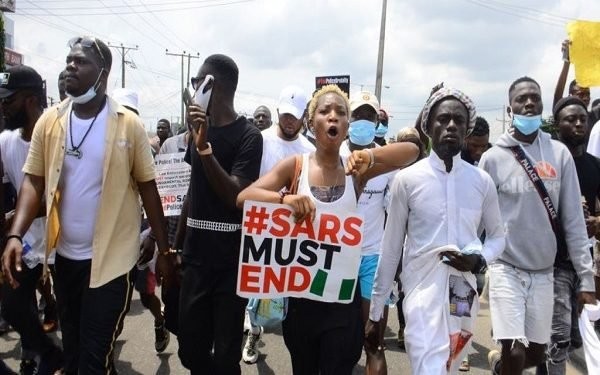Businesses lose N10b daily to #EndSARS protests, say Experts
The #EndSARS protest is taking its toll on the economy and businesses, economists lamented at the weekend.
They put the daily loss in the economy at a minimum N10 billion.
Youths across the country have been on the streets for 12 days in Lagos, Abuja, Kaduna, Owerri, Awka, Aba, Abeokuta, Osogbo, Port Harcourt, Benin and other big cities. They are demanding an end to police brutality.
The government has granted all the requests.
In the new #7for7 list, the protesters are demanding institutional reforms, reduction in cost of governance, constitutional amendment, education reforms, health reforms, youth affairs and public office reforms.
Economists and business managers say business decisions, meetings, events, investment conferences and boardroom decisions have been put on hold as the protest spreads.
Former Executive Director, Keystone Bank Limited, Richard Obire, said the protest hit the economy at a time most of the businesses were just adjusting to the impact of the COVID-19 pandemic. He said it is affecting people and goods’ mobility.
According to him, blockage of critical roads to major cities has negative impacts on the economy whose extent of damage has run into billions of naira so far.
Obire said: “The other side is that if the protests lead to a more positive response by the government and good governance, it will be a major enabler of economic activity.
“The benefits or continued impact of the protests will depend on how the government handles its response. For now, the protests have been peaceful and have not degenerated. Foreign investors are happy when the rule of law prevails. They want predictability of policy, sanctity of contract and reduced crime environment. So, if at the end of the protests these things are achieved, foreign capital inflows will be guaranteed.
Director-General, Lagos Chamber of Commerce and Industry (LCCI), Dr. Muda Yusuf, said the protest is crippling businesses and economy, especially the Small and Medium Enterprises (SMEs).
According to him, the SMEs live by daily income and the continued disruption of their businesses lead to huge loss of income and business growth.
“For me, the earlier the government engaged the protesters, the better for the economy. The President should dialogue with the protesters for quick resolution,” Yusuf advised.
An economist and former President, Chairman of Council, Chartered Institute of Bankers of Nigeria (CIBN), Okechukwu Unegbu, said whatever the economy loses will be temporary and could be gained if the expected reforms are instituted.
Unegbu said the protests would make the economy better.
“Look at the economy even before the protests, the interest rates were rising, loan default in banks kept worsening as businesses find it difficult to repay loans, inflation has been rising, making it difficult for people to meet their needs and naira has lost a large part of its value in recent months. The protests will help government and agencies of government to critically look at how to reposition the economy.”
Unegbu said the level of economic activity, especially production, has been nosediving and if the protests become successful, and policy recommendations implemented, foreign investors will flood Nigeria with their capital.
“In the next three months, we are likely to see a rise in foreign direct investment if the protesters’ demands are resolved. Whatever losses the economy and businesses have incurred in recent weeks will be offset by improved business environment and corporate governance practices,” he said.
The initial five-point demand of the protesters are: release of arrested protesters; payment of compensation to families of victims; investigation and prosecution of all reports of misconduct; proscription of the Special Anti-Robbery Squad (SARS) and review of police welfare.
They are demanding the immediate implementation of all demands. (The Nation)


